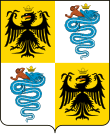Sforza family
| House of Sforza | |
|---|---|
 |
|
| Parent house | House of Visconti (through Bianca Maria Visconti) |
| Country | Italy |
| Ethnicity | Italian |
| Founded | 1447 |
| Founder | Muzio Attendolo |
| Final ruler |
Milan:
Francesco II (1535)
Pesaro:
Galeazzo (1519) |
| Titles |
|
| Estate(s) | Milan, Pesaro, Gradara |
| Deposition |
Milan:
1500: Italian Wars
Pesaro:
1519: Death of Galeazzo
Two Sicilies:
1624 |
| Cadet branches |
Illegitimate
|
Illegitimate
The House of Sforza (pronounced [ˈsfɔrtsa]) was a ruling family of Renaissance Italy, based in Milan. They acquired the Duchy of Milan from the previously-ruling Visconti family in the mid-15th century, and lost it to the Spanish Habsburgs about a century later.
Rising from rural nobility of Lombardy, the Sforza family became condottieri and used this military position to become rulers in Milan. The family governed by force, ruse, and power politics, similar to the Medici in Florence. Under their rule, the city-state flourished and expanded.
Muzio Attendolo (1369–1424), called Sforza (from sforzare, to exert or force), founded the dynasty. A condottiero from Romagna, he served the Angevin kings of Naples and became the most successful dynast of the condottieri.
His son Francesco I Sforza ruled Milan, having acquired the title of Duke of Milan (1450–1466) after the extinction of the Visconti family in 1447.
The family also held the seigniory of Pesaro, starting from Muzio Attendolo's second son, Alessandro (1409–1473). The Sforza held Pesaro until 1519, with the death of Galeazzo.
...
Wikipedia
